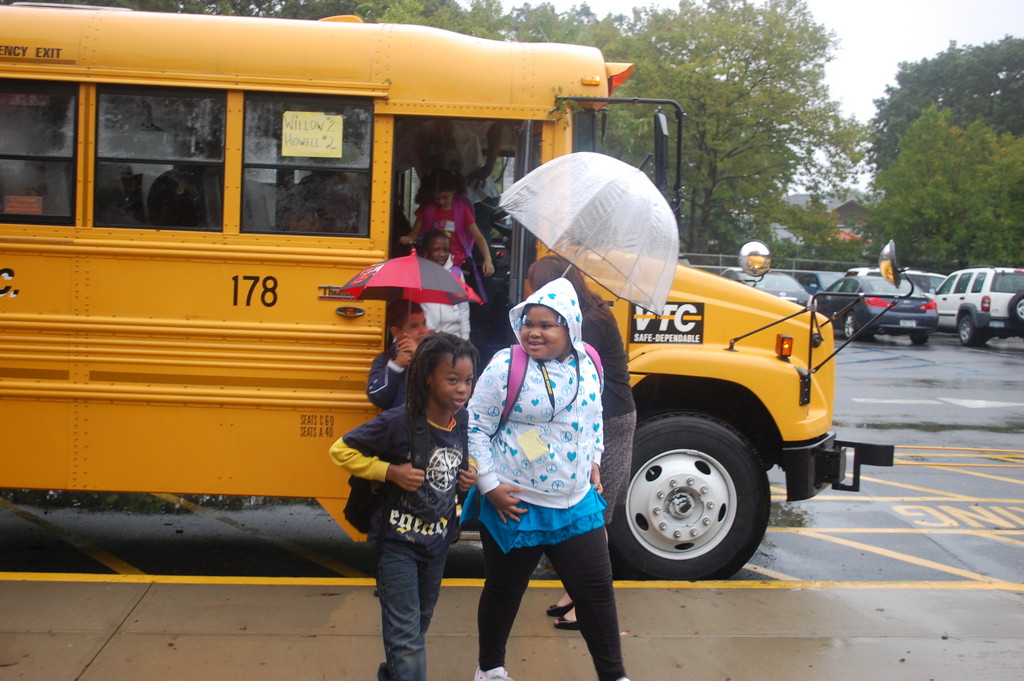District 13 bus vote slated for May 15
The District 13 community will vote on a bus proposition, which would reduce the distance from school beyond which fourth- through sixth-graders are eligible for busing, on May 15 — the same day as the District’s proposed 2012-13 school budget vote.
At its Feb. 28 meeting, the Board of Education voted 5-1 in favor of having a joint vote instead of putting the bus proposition up for its own vote weeks earlier. An additional election would cost the district approximately $27,000, according to Board of Education President Frank Chiachiere.
Meredith Brosnan, the district’s assistant superintendent for business, said the proposition is expected to cost about $296,000, which would push the tax levy over the allowable increase under the state’s new tax-cap legislation. While the budget proposal alone carries a 2.9 percent tax levy increase — just under the district’s permitted limit — the bus proposition bumps the levy increase up to 3.9 percent.
“It’s unfortunate that this is all happening this year, when this new law is enacted,” said Board of Education Trustee Joseph DiSibio.
With a tax levy increase of 3.9 percent, the school budget will need a supermajority — at least 60 percent of voters — to approve it in order to pass. Without the proposition, the budget would need the approval of only a simple majority.
Chiachiere said he has been in touch with legislators and asked them if it “was the intent [of the tax-cap law] actually to have a 59.99 percent vote represent a failed budget?”
DiSibio explained that if the bus proposition were put up independently, it, too, would require only a simple majority, giving it a better chance to be added to the budget. If it is offered along with the budget and fails to be approved by a supermajority, it will not be placed on the ballot again, although the budget would likely be put to a revote. “I am for putting them up together and letting the community decide in one shot,” DiSibio said.
Trustee Jeanne Greco Jacobs was the lone board member who voted in favor of having two separate elections. “I am leaning in favor of having the vote separately,” she said, “so we know what we’re doing with the budget because my feeling is if we put it up together, it’s going to be very difficult to pass a budget with 60 percent. We would most likely have a second vote in June.
“So I have a feeling that regardless, this proposition has now caused us to have two votes,” she continued. “We’re going to end up with two votes unless the budget passes by 60 percent, which it has only done three times in the last 10 years.”
If the proposition were voted on prior to the budget and passed, the board would have to cut nearly $300,000 from the overall spending plan in order to meet the 2.9 percent tax levy increase and give the budget a realistic chance of passing with a simple majority.
Board members questioned how they would make those cuts. “We don’t have $300,000 worth of after-school activities,” Chiachiere said.
The proposition is going on the ballot, Chiachiere explained, because the district received a valid petition. “The will of the people was to put this up based on 122 signatures on the petition,” he said, “and so now we’re just going to move forward.”
If the bus proposition passes, transportation will be available to all students in the district living a half-mile or more from their school, which would mean that an additional 370 children would be eligible for bus service.
Currently, transportation is offered to students in kindergarten through third grade who live at least a half-mile away and those in grades 4 through 6 who live at least a mile away. Because these limits were initially approved by voter referendum, changes can only be requested and approved through the same referendum process.
Greco Jacobs said she is concerned that the May 15 vote could have lasting effects on the district. “The problem really is if both do pass and we do override the cap … what do you do next year?” she said. “That $300,000 is in the budget forever. It doesn’t go away. At some point we’re going to have to deal with it, and that’s the difficult part.”

 54.0°,
Mostly Cloudy
54.0°,
Mostly Cloudy 




